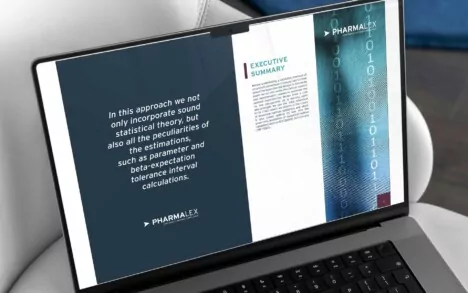Omics Data Science
Advances in omics technologies bring both opportunities and challenges in understanding disease and development of novel therapeutics. In PharmaLex, our experts have over twenty years of experience in understanding omics data – genomics, transcriptomics, proteomics, and metabolomics, among others – and uncovering insights to inform discovery and development of medicines.
Contact our specialists to tailor a service plan
Omics data science – an interdisciplinary solution
The complexity of omics data—technology, structure, high dimensionality, and underlying biology—calls for interdisciplinary solutions to make the best use of data at each stage of the product development process. Our solution is enabled by a highly collaborative team with diverse backgrounds in statistics, epidemiology, AI/machine learning, computational biology, genetics, molecular biology, and others. Our omics data science experts understand scientific needs and business priorities, identify and apply appropriate analytics and algorithms, and interpret results and findings in statistical and biological contexts. We have accumulated over twenty years of experience in helping our clients to uncover insights from omics data in drug target identification and validation, clinical development, use of real-world data, and technology-enabled analysis and visualization of complex data.
We offer global solutions covering the entire product lifecycle
Our solutions, consisting of core services, which are tailored to address each of your unique requirements. Extensive program management expertise is a key success factor within our service solutions.
Omics Data Driven Drug Discovery
Identifying the right targets with favorable efficacy and safety profiles can increase the success rate in the more expensive clinical stages of drug development. The increasing affordability of high-throughput omics technologies leads to exponentially growing data thoroughly describing putative targets (e.g., DNA, RNA, protein, metabolite) and providing necessary evidence to qualify and/or validate those targets. In addition, omics technologies enable data-driven lead discovery and validation which has the potential to significantly reduce experiment cost and shorten the time of discovery.
At PharmaLex, our interdisciplinary team combines expertise in statistics, medicine, genetics, machine learning, computational biology, and data visualization to develop new strategies for drug discovery. We have experience with data from many different omics platforms, developing analysis pipelines with thorough quality control checks, implementing multi-omics analysis approaches and interpreting results in the context of all available evidence including clinical data and data from biobanks, knowledgebases, or disease specific consortia.
Clinical Omics and Pharmacogenomics
PharmaLex’s omics data science team leverages over twenty years of experience in clinical biomarkers to discover and assess biomarkers from omics data. Our experts understand the complex, often high-dimensional omics data—single or multi-omics—in the context of clinical trials. We also collaborate with clients to investigate newly adopted omics technologies (e.g., single-cell omics) in clinical trials.
Pharmacogenomics (PGx) is among the many specialties of our omics data science team. Our experience started prior to the advent of genome-wide association studies (GWAS) and includes involvement in one of the earliest GWAS conducted by pharmaceutical companies. Our experts support clients in all phases of clinical trials including early and late phase and post-marketing commitment and are involved in regulatory interactions.
Public and real-world data
Public and real-world data provide useful resource for understanding disease etiology and progression. When combined with clinical trial data, they bring opportunities in augmenting information to increase efficiency and power of clinical trials.
PharmaLex’s statistics and data science experts integrate statistical methodologies (e.g., Bayesian hierarchical modeling, causal inference) and domain knowledge to maximize the value from public and real-world data. Our experts are experienced in analyzing clinical and omics data from public databases, disease registries, biobanks, and commercial platforms. Examples include dbGaP databases, registries of neurodegenerative diseases, oncology databases (e.g., TCGA, ICGC, GENIE, Flatiron, Tempus), and harmonization and creation of atlas data.
Technology-enabled visualization of complex omics data
“A picture is worth a thousand words”
This adage is particularly true when considering the visual representation of data, especially complex and/or large data often from omics technologies. An interactive image can help to see relationships, find trends, or identify the “needle in the haystack”. At PharmaLex, we create dynamic visualization tools that look at data from every angle and use them as a means of communication between the analytical team and the scientist or end-user.
Examples of expertise and experience include:
- Develop exploratory visualization tools to allow for client’s interactive data exploration.
- Design an easy query interface for integrated data from multiple sources (e.g., clinical and molecular).
- Visualize highly complex longitudinal biomarker data (e.g. ctDNA) for custom populations and identifying patterns that inform about patient efficacy
- Generate standalone reproducible reports.
Available Resources
FURTHER RESOURCES
Related Services
Clinical Biostatistics
PharmaLex’s Global Statistics and Data Science team brings together a wide range of experts – from study design and planning to statistical analysis, reporting and data management. Our experts help companies with complex innovative trial design, translational and precision medicine, pharmacometrics, and data science across the clinical journey.
More InfoCMC Statistics
In CMC statistics, GSDS has been leading the field and acted as opinion leader for the last 15 years, proposing robust and innovative statistical solutions for the development, validation, and control of processes to manufacture all types of drugs. We help our customers applying the latest guidance on processes, formulation, and assay lifecycle (e.g. FDA process validation, ICH Q1-Q14), from early development and characterization, process performance qualification (PPQ), and assay lifecycle (validation, transfer and routine manufacturing use). We have state-of-the-art expertise in Quality by Design and Analytical Quality by Design. In manufacturing sciences, we also support annual review, acceptance criteria definition, release limits and specification computations, and stability studies.
More InfoDiscovery Statistics
The discovery and pre-clinical development of new drug products is a growing challenge for biopharmaceutical industry. Rapid advances in technologies help to better understand the biology of a new drug product. The vast increase in data, however, increases the risk of false discoveries leading to costly mistakes. In PharmaLex our statistical experts use appropriate statistical methods to improve reproducibility and increase the efficiency of discovery and pre-clinical studies.
More InfoContact Us
Contact Form
Complete this form to stay in contact with us.
Global Approach
PharmaLex has 60+ offices in 32 countries serving more than 1600 satisfied clients worldwide. Search your nearest office.






